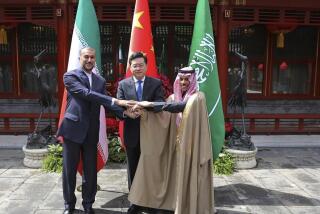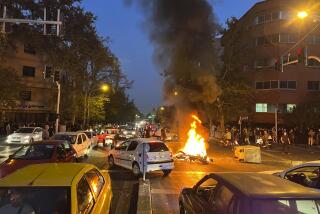Iranian Official’s Visit to Britain ‘Encouraging’
- Share via
LONDON — Britain and Iran took another step in their gradual diplomatic rapprochement on Monday with the arrival here of Iranian Foreign Minister Kamal Kharrazi on the first visit by a top member of the Tehran government since the 1979 Islamic revolution.
Kharrazi paid a brief but symbolic call on British Prime Minister Tony Blair before holding more detailed discussions with Foreign Secretary Robin Cook. Those talks ranged from the comfortable topics of bilateral trade and cooperation in fighting drug trafficking to sensitive issues such as the Middle East peace process, Iran’s reported attempts to secure weapons of mass destruction and human rights.
“The prime minister believed the visit was an important landmark in Iran’s re-integration into the international community,” a Foreign Office spokesman said. He called the meeting “encouraging.”
While Iran’s reformist president, Mohammad Khatami, has visited Italy and France in a bid to improve relations with the West, contacts between Tehran and London have proceeded more slowly.
The two countries resumed diplomatic relations last year after Tehran announced that it would no longer urge Muslims to carry out the late Ayatollah Ruhollah Khomeini’s fatwa, or religious decree, condemning to death British author Salman Rushdie for his novel “The Satanic Verses.” The governments exchanged ambassadors in May after a 20-year hiatus.
The United States views Iran as a state that supports terrorism, providing training, equipment and funding for Hezbollah guerrillas fighting to oust Israel from southern Lebanon, and for Hamas and Islamic Jihad, violent Palestinian groups opposed to the Middle East peace process.
European countries also are concerned about the Islamic Republic’s continued hostility to Israel and its reported attempts to acquire weapons of mass destruction. But the European Union is convinced that dialogue and trade are the best means to encourage reformists in the Iranian government.
Britain has given Tehran more than $2 million in aid to fight the drug trade through Iran to the West. Blair said he supported increasing commercial relations, such as an $800-million oil-and-gas deal that Shell oil company forged to develop two Iranian offshore fields.
Trade between Iran and Britain remains low--less than $750 million in 1998 and about $390 million in the first 10 months of 1999. Britain risks losing out to France, Italy and Germany, whose diplomatic ties with Tehran are further along.
Without being seen to intervene in the internal affairs of Iran, the British government also hopes to bolster pragmatists or reformers such as Khatami. Iran will hold parliamentary elections next month, which will be a test of strength between reformers and religious conservatives.
“It is in our interest to try to develop relations, even though there are problems,” said Paul Rogers, professor of peace studies at Bradford University. “If you don’t engage and you treat Iran as a pariah state or rogue country, that plays into the hands of the more extremist elements.”
Fred Halliday, a professor of international relations at the London School of Economics, added, “As the rest of the neighborhood gets rougher with the coup in Pakistan, Chechnya, and Saddam Hussein getting off the leash in Iraq, Iran looks more attractive as an interlocutor.”
The visit, nonetheless, drew protests from members of Britain’s Jewish community, who demonstrated against the arrest of 13 Iranian Jews who were accused of spying for Israel. The formal charges against them are not known, and they have been held without trial for more than a year.
The Foreign Office spokesman said Blair raised the issue of the 13 Jews and other prisoners held on espionage charges with Kharrazi during their Downing Street meeting.
More to Read
Sign up for Essential California
The most important California stories and recommendations in your inbox every morning.
You may occasionally receive promotional content from the Los Angeles Times.












